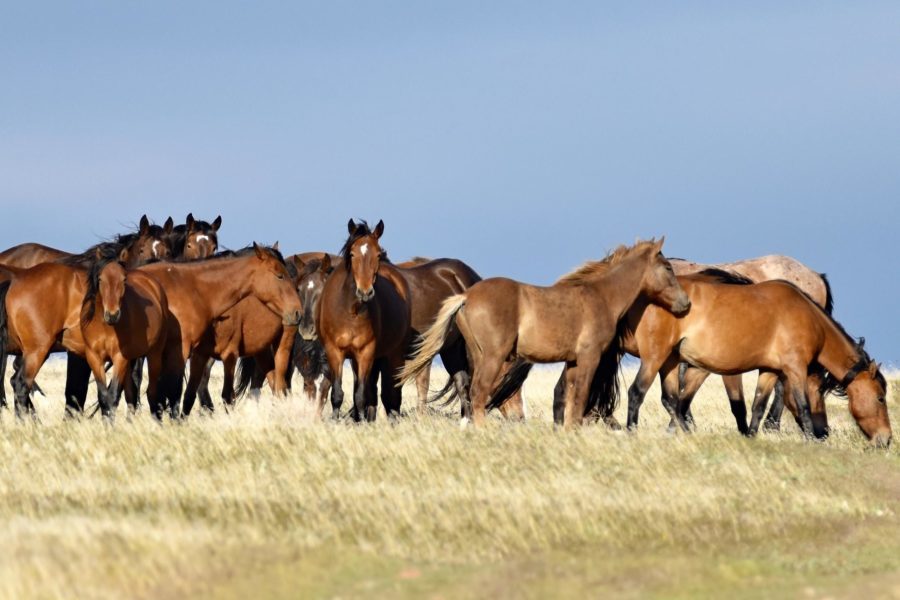This organization pairs up with local residents and the BLM to protect wild horses.
When it comes to preserving and protecting wild horses, activist organizations and supporters, the Bureau of Land Management (BLM) and government legislation each have a part to play. If the channels of communication between these bodies are open, wild horses stand a better chance of remaining safe, free and able to live in harmony with the area’s other residents. Just ask Pine Nut Wild Horse Advocates (PNWHA).
PNWHA is named after Nevada’s Pine Nut mountain range, a wild, majestic and relatively undisturbed region that makes a picturesque backdrop for the bands of wild horses and burros that roam there. The land is rugged, but not barren; thick brush covers the lower slopes while the higher elevations are awash with the pinyon pine trees that inspired the range’s name.
Top 3 misconceptions about wild horses
1. They are “over-populated”
“There is no ‘over-population’ of wild horses,” says Deborah. “As we speak, there are still more cows than horses on Congressionally-designated wild horse habitats.”
2. Wild horses have no natural predators
“Mountain lions and even coyotes are known to kill wild horses, especially foals,” says Deborah. “Wild horses are prey animals; stopping the routine killing of predators would enable them to play the important role they have in natural ecology.”
3. PZP birth control is bad for wild horses
“PZP has been safely and effectively used to manage wild horse populations for 30 years; it’s completely organic and safe. When we look for humane birth control we look for three things: safety, that it doesn’t alter natural hormone production, and reversibility.” Sterilizing a horse is not like de-sexing a dog or cat. It’s a brutish process which removes the hormones that drive the behaviors necessary for horses to survive in the wild. It is also permanent. Reversible birth control allows for more control over the population, as its numbers wax and wane.
Pine Nut and the BLM – partners in progress
“Pine Nut was founded specifically to partner with the BLM, to humanely manage the wild horses living in our local hills,” says PNWHA’s active president, Deborah Walker. It’s true that the BLM and wild horse advocates have not always seen “eye to eye”. In Pine Nut’s experience, however, working collaboratively with the BLM helps ensure the voices of wild horse advocates are heard when the BLM faces pressure from ranchers or Congress.
“Five years ago, the BLM planned to remove most of our horses,” says Deborah. “But at their public meetings, our local community came and spoke out loudly against removing our beloved horses. Thankfully, the BLM listened and instead began to work with us to address horses coming into neighborhoods, and to start our humane birth control program.”
Playing an active role in the community is key
Pine Nut’s goal to safely and successfully keep horses in their native wild habitat means working closely with the community to provide education, outreach and intervention, on both a practical and political level.
Community outreach programs teach residents how to safely live alongside wild horses. By avoiding interaction and refraining from leaving out food and water, people help the horses run a smaller risk of being injured or rounded up.
When it comes to politics, Pine Nut encourages residents and wild horse advocates everywhere to get involved. “Each voice is needed,” Deborah says. “I suggest signing up for action alerts (we support the American Wild Horse Campaign), voicing your opinion to your legislators, and voting for candidates who will protect our wild horses and burros.”
Partnerships and collaborations aside, the BLM is still a government agency, which means they are at the mercy of budgetary constraints and the existing legal framework.
Pine Nut stresses that political activism is one of the best ways to initiate change in the welfare of wild horses. See what you can do below.
Current legislation on Capitol Hill
The U.S Congress is in the middle of the 2019 Fiscal Year appropriations process.
The good news: The Senate’s FY (2019) Interior Department has passed a spending bill that continues to prohibit the slaughter and mass sterilization of wild horses and burros.
The bad news: While the House’s FY (2019) Interior Appropriations bill maintains prohibitions on culling healthy horses and burros, and selling them for slaughter, an amendment put forth by Rep. Chris Stewart (R-UT) added language that would explicitly allow the BLM to use chemical or surgical sterilization to manage growing populations. Both bills await final approval by a full floor vote.
Meanwhile, the Trump administration’s FY 2019 budget calls for eliminating the rider that prevents both the sale and killing, and giving the BLM a “full suite of tools” to manage the herds.
So what can you do? Call your senator to voice your support of the 2019 bill that prohibits the mass slaughter and sterilization. Follow up in writing and continue to spread the word. You can also sign petitions at wildhorseadvocates.org/take-action.html.







